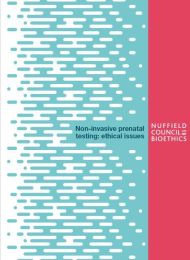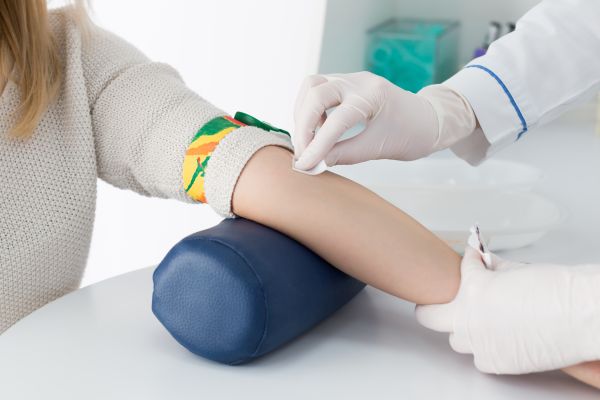Non-invasive prenatal testing: ethical issues
Report
Published 01/03/2017

The members were appointed for their professional knowledge and expertise, and their ability to examine the evidence and views that will be gathered during the project.
Tom Shakespeare
Professor of Disability Research, Norwich Medical School, University of East Anglia
Tom Shakespeare is Professor of Disability Research at the Norwich Medical School, University of East Anglia. His research interests are in disability studies, bioethics, clinical genetics and science communications. He was formerly a member of the Council’s Working Party on genetics and human behaviour.
Louise Bryant
Associate Professor in Medical Psychology, University of Leeds
Louise Bryant is Associate Professor of Medical Psychology at the University of Leeds. Her main research interests are in psychosocial aspects of prenatal screening and the implications of implementing new screening technologies into routine care. Louise is currently chairing the NHS Fetal Anomaly Screening Programme Information and Education Group. She has also worked as an academic advisor on the current NHS booklet ‘Screening Tests for You and Your Baby’.
Tara Clancy
Consultant Registered Genetic Counsellor and Honorary Senior Lecturer, Manchester Centre for Genomic Medicine
Tara Clancy is a Consultant Registered Genetic Counsellor (GCRB 190) and Honorary Senior Lecturer at the Manchester Centre for Genomic Medicine. Her main clinical and research interests are cancer genetics and ethical, legal and psychosocial issues in genetics. She is Chair of a University of Manchester Research Ethics Committee, and is on the Steering Group of the UK’s Genethics Club.
Angus Clarke
Clinical Professor, Institute of Cancer & Genetics, Cardiff University
Angus studied genetics and then clinical medicine. He trained in medicine, paediatrics and then clinical genetics, becoming a consultant in Cardiff. His research has examined clinical and molecular genetic aspects of ectodermal dysplasia and Rett syndrome as well as social and ethical aspects of human genetics. He founded and directs the Cardiff University MSc course in Genetic Counselling and conducts research related to the genetic counselling process.
Zuzana Deans
Teaching Fellow, School of Social and Community Medicine, Bristol University
Zuzana Deans is a Teaching Fellow in Medical Ethics at the Centre for Ethics in Medicine, School of Social and Community Medicine, University of Bristol. Zuzana’s background is in philosophy, and she has worked in applied ethics for over a decade. Zuzana has been a researcher for two major projects on non-invasive prenatal testing: SAFE (Special Non-Invasive Advances in Fetal and Neonatal Evaluation) and RAPID (Reliable Accurate Prenatal non-Invasive Diagnosis).
Shaun Pattinson
Professor of Medical Law and Ethics, Durham University
Shaun Pattinson is Professor of Medical Law and Ethics at Durham University and Deputy Head of Durham Law School. His scholarship spans a wide range of topics within law and bioethics, including prenatal testing. His principal publications are Influencing Traits Before Birth (Ashgate 2002) and Medical Law and Ethics (4th edn, Sweet & Maxwell 2014). He sits on advisory boards for various national and international research projects.
Clare Walker (joined in July 2016)
Academic Clinical Fellow in Public Health, Warwick Medical School and Public Health England, West Midlands
Clare is an Academic Clinical Fellow working between the University of Warwick and Public Health England (PHE) in the West Midlands. She has commissioning experience across a range of organisations including PHE, Health Education England and NHS England, and has worked on the Warwick Evidence on NICE Technology Appraisals and Guidelines. Clare is a qualified GP and member of the West Midlands Maternity and Newborn Steering Group.

Share